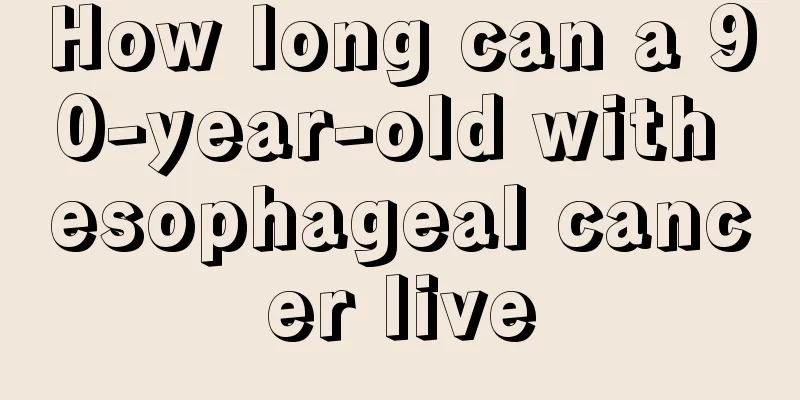How long can a 90-year-old with esophageal cancer live

|
How long a 90-year-old esophageal cancer patient can live depends on many factors, including the stage of cancer, the patient's physical condition, and treatment methods. Patients with early-stage cancer may survive for several years with effective treatment, while patients with advanced stages may have a shorter survival time. It is recommended to actively communicate with doctors to evaluate the specific situation and develop a suitable treatment plan. 1. Factors affecting survival time How long a patient can live is closely related to the stage of the disease. Early esophageal cancer is confined to the esophagus lining and is more effectively treated, while mid- to late-stage cancer may have spread locally or metastasized to distant sites. The patient's overall health, including cardiopulmonary function and immunity, also directly affects prognosis. For 90-year-old patients, due to their weaker physical function and lower tolerance to treatment, a comprehensive assessment is needed to determine the treatment strategy. 2. Treatment methods and effects 1. Surgical treatment: Early-stage patients can choose surgical removal of the tumor, but whether a 90-year-old patient is suitable for surgery requires comprehensive evaluation. 2Radiotherapy: For patients who cannot undergo surgery or those with advanced disease, it helps control tumor progression and relieve symptoms. 3. Chemotherapy or targeted therapy: used for advanced treatment, the decision to proceed is based on the patient's physical condition, while monitoring side effects. Early scientific treatment may significantly prolong survival time, but in the middle and late stages, the goal is more to relieve symptoms and improve quality of life. 3. The auxiliary role of diet and nursing Nursing care for elderly patients is crucial. Ensuring nutritional intake is helpful for maintaining physical strength and supporting treatment. Soft, high-calorie, and easily digestible foods can be selected. Pay attention to preventing complications such as aspiration or infection. It is recommended that family members observe the patient's condition at any time and communicate with the medical team. 4. The importance of mental state The fear and anxiety of 90-year-old patients about the end of life need to be relieved in time. Family members' care, companionship and respect for the wishes of the elderly can bring spiritual comfort to the patients and help them maintain an optimistic attitude. For elderly patients with esophageal cancer, paying attention to their physical condition, choosing scientific treatment methods and strengthening care are the keys to prolonging life and improving the quality of life. If you or your family are facing similar situations, please contact medical professionals as soon as possible to get help. |
<<: Prostate cancer life expectancy
>>: Early symptoms of brain glioma
Recommend
The harm of ethylene to the body
Due to the improvement of living standards, many ...
What are the treatments for lung cancer? 4 best treatments for lung cancer
Experts say that the current treatment for lung c...
The nutritional value and efficacy of pigeon eggs
The size of pigeon eggs is much smaller than the ...
Fat burning bomb
As people's living standards continue to impr...
There are red bumps on the chest skin
In fact, we find that pimples not only appear on ...
What is radionuclide therapy and what are its effects?
Nuclear therapy is a method of treating tumors. I...
Can we eat pig neck bones?
Many people do not know whether pig neck bones ar...
What causes pressure urticaria?
Many people may have heard of urticaria. It is a ...
What are the symptoms and dangers of laryngeal cancer
What are the symptoms and risks of throat cancer?...
Five deadly diseases caused by smog weather
Recently, the smog weather that has persisted for...
How long can you live after being diagnosed with testicular cancer
In modern life, when talking about testicular can...
Can thyroid cancer be cured by taking medicine
Many thyroid cancer patients are afraid of having...
What is the best way to wash your hair for tinea capitis
Tinea capitis is a very annoying skin disease cau...
Can radiotherapy and chemotherapy be used for advanced nasopharyngeal carcinoma?
Clinically, for patients with advanced nasopharyn...
Can I take roxithromycin after drinking alcohol?
Many people like to drink alcohol. In fact, moder...









